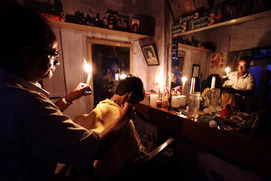
New Delhi, August 1: Three electricity grids connecting more than 20 states and the national capital collapsed on Tuesday, triggering what is now being called the country's worst power crisis, and what's worse, it was the second in two days.
Even as the Power Ministry scrambles to restore normalcy, inquiry has begun over what caused it.
Sources say that the trouble started in the Eastern Grid this time. The optimal transmission frequency for any grid is 48 hertz, but the number dropped to 47.50 in the Eastern Grid and 47.69 in the Northern Grid.
While no specific region has been named so far for the overdrawing of power, the Centre has blamed four states - Haryana, Uttar Pradesh, Rajasthan and Punjab.
Meanwhile, there is uproar over Power Minister Sushil Kumar Shinde's promotion to Home Ministry on a day half of the country suffered a total blackout.
The Opposition has even questioned if this promotion was a reward for his loyalty to the Gandhi family.
Life thrown out of gear
The blackout in 20 states across north, eastern and north-eastern India affected more than 60 crore people and severely impacted train services in six railway zones, bringing 300 trains to halt.
The worst sufferers were 265 miners who got trapped in coal mines in West Bengal and Jharkhand due to the power outage. They were evacuated after hours of agony.
In the national capital, thousands of Metro commuters had a harrowing time when the trains stopped inside the tunnels as transmission lines tripped at 1 pm. The power collapse triggered disruption in Metro and train services, crippled water supply and choked roads due to non-functional traffic lights.
States that got affected
Northern Grid states: Delhi, Punjab, Jammu & Kashmir, Himachal Pradesh, Haryana, Uttar Pradesh, Rajasthan, Uttarakhand.
Eastern Grid states: West Bengal, Odisha, Jharkhand, Bihar
North East Grid states: Sikkim, Assam, Mizoram, Manipur, Nagaland, Meghalaya, Arunanchal Pradesh.
Blame game begins
For the first time, the three inter-state transmission networks - Northern Grid, Eastern Grid and North-Eastern Grid - tripped together.
Speaking to mediapersons about the crisis, Sushil Kumar Shinde, who shifted from the Power Ministry to the Home Ministry on Tuesday, put the blame of the grid failure on the states that have been over drawing power. He said, "We had warned several states about overdrawing of power. So we had to face second grid failure in less than 24 hours."
He also warned the states against overdrawing electricity above their limits, saying, "If states overdraw from their regular quota, they will be penalised."
Earlier, Power Grid Corporation of India Ltd chairman RK Nayak said that the problem was difficult to be located because of a complex network.
He further said that some sections are creating problems due to over drawing of power, but the glitch would be plugged by night.
Nayak, however, said he could not give any assurance without analysing all the details.
The blackout also gave an opportunity to the Opposition to hit out at the government over its failure to prevent the power crisis.
Gujarat Chief Minister and Bharatiya Janata Party (BJP) leader Narendra Modi posted a tweet saying, "Pradhan Mantri ji, 60 crore people and 19 states are in darkness. Country wants to know is there any coalition dharma you are following here too?"





Comments
Add new comment